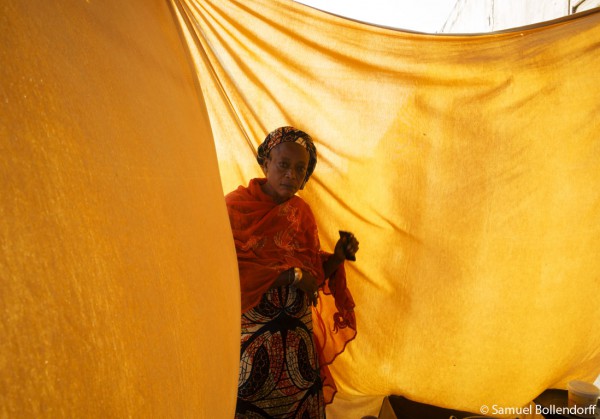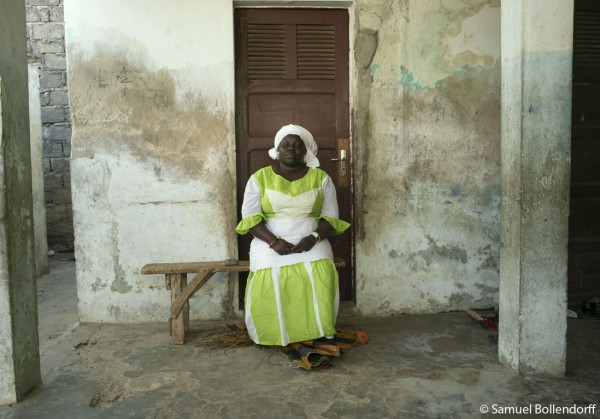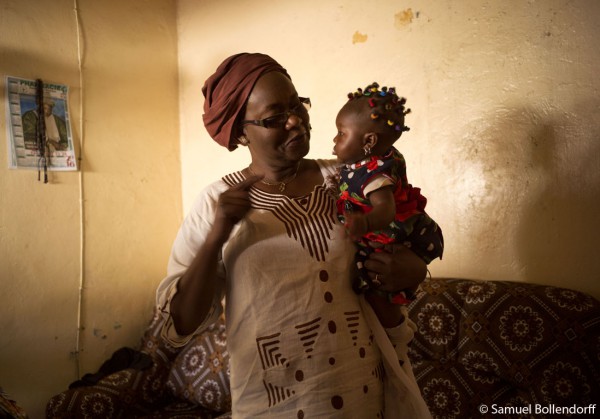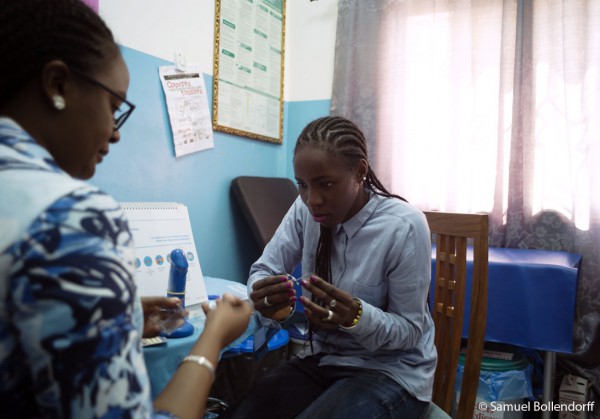Between women’s liberation and economic growth, Senegal has made birth control a unifying social project. Personal account and interviews.
“It’s 5 o’clock in the morning, and Pikine is waking up. It’s 5 o’clock in the morning and I’m tired…” the women in this district of Dakar, home to over 900,000 people, could sing together in chorus. While the call of the muezzin rings out, only the donkeys stir in the sandy alleyways. In their small courtyards, the women are already busy, preparing breakfast. At 7 o’clock, boys and girls in uniform set off for school. Surprisingly, there are few very young ones. The women burst out laughing. “Now, we space out the births,” they answer, happily. They all use access to contraception as an irreversible form of emancipation. Behind this (r)evolution is a programme supported by external funding, but entirely thought up and implemented locally. Why are those responsible for the programme so convinced? Because it allows women to stagger their pregnancies, contraception helps to reduce infant and maternal mortality, while also improving living conditions for all.
“For a long time, birth control was not a priority”
On the western point of Africa, Senegal is a poor country, with an average gross annual income of €925 per person in 2014*. Around half of the population is aged under 15. Here, many women get married before the age of 20 and have on average five children. The energetic minister for health and social action, Professor Awa Marie Coll Seck, tells us that “between now and 2035, one of the aims of the Emerging Senegal Plan is to invest in human capital. To do this, the population needs to be in good health and not too large. The only solution is access to contraception.” In a country where polygamy is still the rule and birth control is almost non-existent, the challenge is considerable. “Family planning arrived in Senegal in the 1960s,” says Awa Marie Coll Seck, “but for a long time, birth control was not a priority.” Everything changed in 2010 thanks to a campaign initiated by American NGO IntraHealth International. Supported by the Bill & Melinda Gates Foundation, the pilot programme set itself the target, in eight poor urban areas, of increasing the number of women using modern contraception (pill, implant, injections, IUD) from 25% to 40% in eight years. Since the start of this year, this target has been met. How? By drawing on local strengths, including a huge majority of women.
Imposing in her turban, Khadija Toudramé, age 49, begins her tour of Pikine. The “badienou gokh” [district mentor – note from the editor] promotes contraception to her neighbours. Her small case contains pills, an implant, an IUD, an injection kit, male and female condoms, documentation… On the way, she tells us her story.

“Married at the age of 18, I have seven children, aged from 9 to 30. My husband has three wives and fourteen children, and doesn’t give me any money. Men are often against contraception, but they don’t die in childbirth and are not exhausted by close together pregnancies! I am committed to promoting contraception and my daughter is also 19 years old.” A bit later, in the tiny living room of a clean concrete and sheet metal house, we meet Fatou Gueye, age 45, nine children and eleven pregnancies, accompanied by two of her daughters, Adjiaratou, age 19, pregnant, and Dieynaba, age 25, a young mother. She also introduces Aïda Diouf, age 48 and ten children, head of local sponsors for the Pikine district, who yells at the boys of the family: “This concerns you too!” Aïda goes back to the subject: “Contraception should be of interest to everyone. I talk to girls aged 7 or 8, so that when they reach 15 they are informed as they begin their sexual lives. I hand out condoms before or after football matches, I organise talks…”

“We are getting more and more informed couples”
The local success of this contraception programme is the result of a global project. Coordinator in Pikine of the department for health and reproduction and child survival, Fatou Vanne, age 60, welcomes us to her small office in the Dominique health centre. “Here, midwives carry out 24 contraception consultations each day. In four years, births have fallen by 20%. While a lot of young mothers come to us, we are getting more and more informed couples.” To achieve their targets, the IntraHealth specialists have trained health workers. They have revised the delivery and storage system for contraceptives in order to avoid stock-outs. They have also worked to improve prices, which are at an all-time low (less than €1 for a quarterly injection), and have increased the number of television and radio broadcasts, like the Sud FM show hosted by Ndèye Khady Diop. And they have called on religious authorities for their help.
“If the religious leaders are convinced, the population will follow”
“In Senegal, limiting the number of births is complicated as religion plays an important role in society,” explains Fatou Vanne. And family planning is not a personal matter. Mother in law, parents, sisters, brothers, all have their say on the couple. And so, women favour the most discrete solutions: implants or injections. To break down the taboos, it is necessary to convince the imams. This is what we have done with the Islam and Population Network, which drew up a religious argument in 2011.”

This draws on chapters of the Koran, references to certain hadiths and the opinions of ulemas who approve use of contraception. “Azl [coitus interruptus – note from the editor] was practiced during the time of the prophet and Islam recommends breastfeeding children for two years,” says imam Moussé Fall, age 32. Regularly, the young man holds workshops bringing together imams, heads of Koranic schools and religious teachers. On this particular morning, around 10 people take their place around a long table. Standing in his blue bazin robe, Moussé Fall sets out the theological arguments in favor of spacing out births. An hour later, the reactions are almost unanimous. “I was reticent to begin with, as Islam is against any imposed limitation of births,” explains a white-bearded imam. But your demonstration has convinced me. I am going to talk about family planning.” Some voices speak out nonetheless, worried about the “western plot”, the “risk of depravation and adultery” and “encouraging fornication”. “Senegalese society is generally chauvinist”, sighs Imam Fall. “We are lucky that our Islam is progressive and of the Sufi tradition, with very powerful brotherhoods. If the religious leaders are convinced, the population will follow.” We see proof of this the following day.
In a mosque under construction, the Friday prayers are led by Imam Oustaz Assane Seck, also a presenter on TFM, Youssou N’Dour’s TV channel. “I have just come out of a program on family planning,” he tells us by way of introduction. Ten minutes later, between a wheelbarrow and bags of cement, hundreds of men kneeling on their mats listen to him talking about contraception, reducing maternal mortality, health centres and modern methods. “The secret,” he then explains, “is dialogue. Everyone gives their opinion and, being respected, can change.” This is encouraging knowing that phase II of the “family planning” project, rolling it out to the level of the country as a whole, has been launched. This just leaves the younger generation. “In Senegal, like in many Muslim countries, sexual life is subject to marriage,” laments Emmanuel Seyni Diop, age 29, coordinator of the youth program for NGO Marie Stopes International.
The vast Cheikh-Anta-Diop University has 80,000 students, 20,000 of whom live on campus. At the university’s health center, two rooms have been home to the reproductive health unit since 2014. Boys and girls flock to it. “In the space of two years, we have reached around 15,000 young people and the number of pregnancies on campus has shrunk,” cheers midwife Maïmouna, age 28. “It has been such a success that condoms are now provided self-service in the waiting room!” For Emmanuel, raising awareness among young people is a major challenge. “The subject is still taboo,” he says regretfully. “Globalization and social media are destroying traditional culture in urban areas. It is vital that we work with these young people, who will be the leaders of tomorrow.”

A collective challenge
On the final evening of our stay, we meet Fatimata SY, head of the Ouagadougou Partnership. Sitting with a fruit juice, she details the challenges facing the group, representing nine West African countries (Benin, Burkina Faso, Ivory Coast, Guinea, Mali, Mauritania, Niger, Senegal and Togo) or 124 million people. “Access to contraception is particularly poor in the sub-region,” she explains. “This is due to social standards, health systems that have abandoned the issue and the lack of funding. The example of Senegal proves that this trend can be rapidly reversed.” To the extent that some people are worried and are asking for a moratorium, fearing that the birth rate could fall…
“Our aim, by reproducing the solutions developed in Senegal, is to provide contraception for an additional 2.2 million women in the region by 2020. As Melinda Gates often says, investing in contraception has enormous effects in terms of development. This will change everything on our continent.” This was the message she passed on in early June in Paris, where she met donors.
Far from the trendy seafront restaurant, in the humidity of Pikine, night has long since fallen. First to rise and last to go to bed, women are tidying, cooking and preparing for the next day. Exhausted but, paradoxically, relieved as they know that they can now look after their children properly and choose when and if they will be mothers again.
Source: World Bank